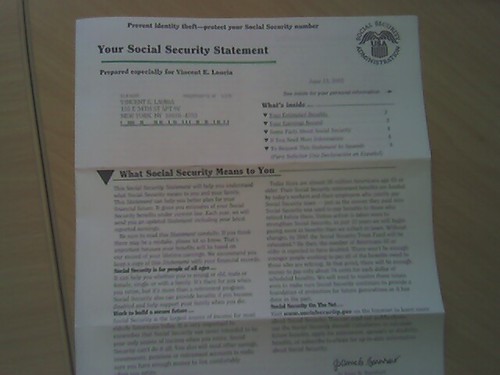Tuesday, July 05, 2005
Social Security - the issue isn't dead yet

I just received my quarterly "Social Security Statement" in the mail today. For whatever reason, I decided to read the entire pamphlet. For those not familiar with the statement, it basically shows your employee earnings for all the years worked and how much Social Security you would be eligible for if you went on disability, retired, or died (in that case, what your family would receive.)
However, something at the bottom caught my attention. In the U.S., we pay 6.2% up to $90,000, our employer matches that as well. That's 12.4% of your income if your employer could give you that cash.
So we have this whole Social Security issue that made the limelight a few months back, but what I never learned was this up to $90,000 fact.
Half of U.S. households (that's 50%) earns less then $43,528/year. So the bottom half of our country pays 12.4% of their income to Social Security. Yet almost 20% of our population earns over $90,000. And the top 5% earning more then $154,120. That means the top 5% of our population is paying < 6% of their income.
Nobody is debating that the rich should pay higher taxes, but I certainly don't think the poor should pay higher taxes!
I know this isn't news to a lot of people, but it's the first time I ran some calculations, here's an Excel worksheet I put together (some cells have 'comments' explaining the values) that is a little rough around the edges. What it basically says, is that if you taxed the same 12.4%, but only taxed the income between $54,440 - $154,120, you would come within the order of 5% of SS's current yearly revenue. So if we extended that cap up to $200k or $250k, it would generate a lot more revenue that current methods.